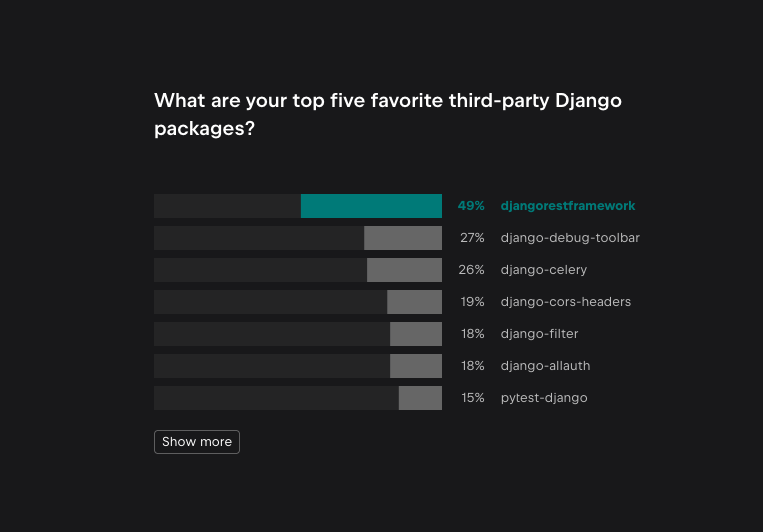The 2025 State of Django’s top packages
Top packages in the State of Django 2025, relative to downloads
The State of Django 2025 is out! One of my fav highlights from it is always the top third-party packages in use by survey respondents - but compared with package downloads. Let’s take a look.
What are your top 5 favorite third-party Django packages?

The top results are expected if you’ve spent time in the Django ecosystem (Django REST Framework, Debug Toolbar, Celery, etc.). What I find really interesting however is to review those "% 5 favorite" results relative to package downloads figures. We want to see what packages are "most appreciated" (high satisfaction, low downloads): relatively high placement in "top 5 fav packages", despite a relatively low download count.
Most appreciated packages
Here they are, top 5, ordered by % favorite relative to 30-day downloads:
- django-ninja (check out our official Wagtail integration guide!), 10% top 5 for 199k downloads
- Wagtail (🎉), 7% for 193k
- Celery, 26% for 928k
- django-allauth, 18% / 705k downloads
- dj-rest-auth, 5% / 206k downloads
Wagtail was #1 in 2023 and 2022 by that metric - there is clearly no stopping the popularity of Ninja, which also has the biggest popularity bump irrespective of downloads - from 6% to 10%.
Unsung heroes
Looking at packages that score super high in downloads but aren’t seeing commensurate appreciation, here are the results:
- pylint-django - developers take linting for granted, or have a love-hate relationship with the idea?
- django-cors-headers, a clear "unsung hero" with millions of downloads and a lot of appreciation.
- django-model-utils
- django-storages
- django-filter
What it means
It means it’s time to try Django Ninja if you haven’t already! Or its community-focused fork django-shinobi. And perhaps for Wagtail, we should consider improving the authentication out of the box, or having an integration with allauth? This is clearly in high demand in the Django community.
Check out the full State of Django 2025 report for more interesting tidbits like this.
